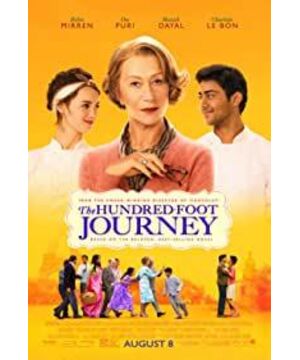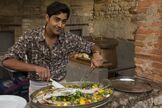By Hollywood standards, the movie isn't romantic. The emotional development between the hero and heroine Hassan and Margaret seems to be uneventful, and there is not even a moment of deep love, a surging climax, even before Hassan left the village in order to seek career development as a three-star chef Saying goodbye to Margaret in the rain is such an understatement. For a moment, I really felt that the role of the protagonist was really sorry for the Chinese title of "Michelin Love".
In contrast, Helen, who plays two restaurateurs The demeanor of Mirren and Om Pury is really impressive. This is definitely a pair of "happy friends", whose demeanor obviously overshadows the hero and heroine. In my mind, they are the real protagonists of this movie. Helen Madame Mallory, played by Mirren, insisted on running this French restaurant for her deceased husband; and Hassan's father, played by Om Puri, followed the bereaved wife's heart and resolutely decided to set up camp and open a store in this beautiful French countryside. They all blend the most important emotion in their lives into the food they are most familiar with. The two people met, knew, fell in love, and accompany each other because of food. The battle of wits and courage during the period was so humorous and humorous, the mutual bond was so subtle and moving, and it was so tender and sweet until they finally came together. Moved, smiled. Now that I think about it, the movie poster is not about Hassan and Margaret, but Helen. Mirren, in addition to her popularity and big name, also has something to do with her weight in the story.
Let's talk about food. Whether it is French cuisine or Indian cuisine, to be honest, the director does not seem to put much effort into the food itself, and the presentation of all the delicacies in the film can only be regarded as a glamorous glimpse. As a food movie, this is a big shortcoming. However, if the English title "The Hundred-Foot Journey" is used to examine the status of food in the film, then everything is reasonable. From beginning to end, the director never prepared to put food at the core of the film, but used it as a cultural symbol, communication channel and emotional sustenance. The people in the film are all connected because of food, whether they are happy, sad, laughing, or confused, until they turn around a thousand times and eventually become a married couple. Compared with the food itself, the group of people who make the food is more the director wants to show the group of people who make the food-their dedication to the food shows exactly their persistence and perseverance in their love, and their dedication to emotion. Their purity and intensity will not be shaken by worldly thoughts. They all live in a world that cannot be more clear, and all the joys, sorrows, sorrows, and joys are so real, and no impurities are visible. It is precisely because of this that every dish is pleasing to the eye and delicious, which in turn becomes a touching and a kind of enjoyment. In fact, isn't our love for food also due to such a simple experience-forget all the worldly troubles for a while, and focus on the feeling of the taste buds at that moment, there is nothing in the world that is simpler and purer than this feeling .
The beauty of food lies in the inclination of people. When the film ended, this sentence jumped into my mind. Maybe this is what the director wants to tell us.
View more about The Hundred-Foot Journey reviews











